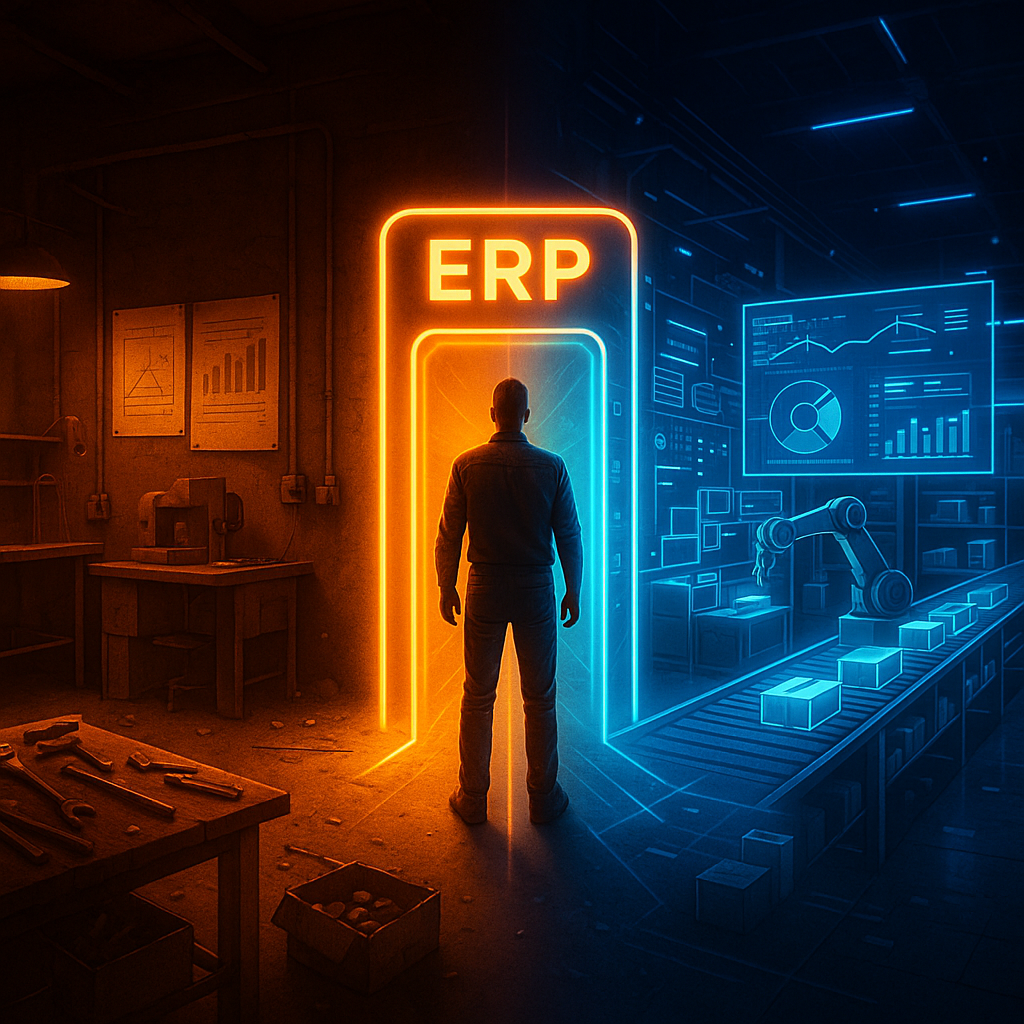ERP for Government Contractors: 2026 Guide to CMMC & DCAA Compliance
Enterprise Resource Planning (ERP) systems are essential for government contractors, helping streamline operations and improve efficiency. In this...
7 min read
 Blake Snider
:
Nov 17, 2025 12:00:00 AM
Blake Snider
:
Nov 17, 2025 12:00:00 AM
Enterprise resource planning (ERP) has become the backbone of transformation in the utility sector. As we move into 2026, energy providers face unprecedented demand, stricter regulatory mandates, and the urgent push for grid modernization. ERP software offers the structure and visibility needed to thrive in this volatile market. By integrating financials, operations, and customer service into one platform, ERP helps utilities cut costs, improve decision-making, and adapt to an increasingly digital industry.
Enterprise resource planning (ERP) systems are essential for industries with complex operations, and the utility sector is no exception. As companies face growing demands for efficiency, regulatory compliance, and digital transformation, ERP software provides the tools needed to manage operations effectively. A Deloitte survey in 2023 found that more than 67% of utility providers worldwide had already adopted digital transformation initiatives, with ERP systems as the cornerstone. Purpose-built ERP software enables utilities to automate critical processes, analyze real-time data, and scale operations to meet shifting industry demands.
The energy sector, a vital component of the utility industry, operates on a scale and complexity that necessitates powerful ERP solutions. ERP software designed for energy companies tackles the specific challenges of managing the entire lifecycle of physical assets, from power generation through transmission and distribution. These processes require specialized features for detailed asset tracking, regulatory compliance, and real-time analytics, which are critical for optimizing energy production and delivery.
A key advantage of ERP software for the energy industry is its capacity to manage operations across the full spectrum, from upstream to downstream activities. Whether it's overseeing fuel supply chains, managing power generation, or maintaining grid infrastructure, ERP systems provide the necessary visibility to anticipate and mitigate risks. Additionally, energy companies can leverage ERP tools to enhance their field service operations, ensuring that maintenance teams are equipped with actionable data. This capability helps reduce downtime and ensures higher service reliability.
Financial management is another indispensable feature of utilities ERP software, particularly for energy providers. These systems offer robust tools to manage accounts payable, accounts receivable, and other financial operations, enabling companies to maintain tight control over budgeting, cost management, and financial reporting. For energy companies, this translates into more efficient operations and better financial oversight—both of which are essential for sustaining profitability in a capital-intensive industry.
Utility companies operate in a high-stakes environment where operational efficiency and risk management are crucial. ERP software for utilities plays a key role in helping these organizations streamline their operations, offering a comprehensive suite of management tools to optimize everything from financial planning to inventory management. By consolidating various processes into a single ERP system, utility companies can avoid data silos, reduce inefficiencies, and gain a clearer view of their entire operation.
One of the most significant advantages of using an ERP solution for utility management is the automation of routine processes. Utility companies must manage large volumes of data across their operations, from customer billing and field service management to asset maintenance and regulatory compliance. A well-implemented ERP system enables real-time data processing, reducing the potential for human error while increasing operational efficiency.
Additionally, ERP software helps utility companies manage their infrastructure maintenance needs by offering visibility into potential issues before they escalate. Through predictive maintenance features, these systems can analyze data from equipment sensors and other sources to alert management to upcoming maintenance needs. This proactive approach not only reduces downtime but also extends the lifespan of critical assets, contributing to long-term cost savings.
As utility companies upgrade aging infrastructure, the role of Artificial Intelligence (AI) within ERP systems has shifted from a luxury to a necessity. Modern ERP solutions, such as IFS Cloud, now integrate AI-driven predictive analytics that can forecast load imbalances and equipment failures weeks in advance.
By feeding real-time data from IoT sensors directly into the ERP, utility leaders can automate maintenance schedules—replacing reactive repairs with proactive asset management. This shift not only prevents costly outages but also ensures that capital expenditure is directed exactly where the grid needs it most.
Billing is a core function in the utility industry, involving intricate pricing structures, consumption-based billing, and adherence to regulatory requirements. ERP software for utilities is equipped with advanced billing modules that streamline these processes, enabling utility companies to manage customer accounts, calculate billing rates, and handle payment processing more efficiently.
The ability to automate billing processes ensures that utility companies can reduce the administrative burden on their staff while minimizing errors in billing statements. With an ERP solution, utility providers can offer their customers more accurate and timely invoices, improving customer satisfaction. Additionally, these systems can integrate with customer relationship management (CRM) tools, allowing utility companies to track customer interactions and respond quickly to service requests or inquiries.
ERP systems also allow utility companies to implement flexible billing options, such as tiered pricing, usage-based charges, and dynamic pricing models. This level of customization ensures that utility providers can tailor their billing practices to meet the specific needs of different customer segments, whether they are residential consumers or large industrial clients. By offering greater billing flexibility, utility companies can enhance their overall service while maintaining regulatory compliance.
The digital transformation of the utility industry is gaining momentum, with cloud-based ERP solutions playing a pivotal role. Cloud ERP allows utility companies to access their enterprise resource planning systems from anywhere, providing flexibility and scalability that on-premises solutions may lack. This is especially important for utility providers operating in geographically dispersed areas, where having a centralized system that can be accessed by field teams and remote offices is critical.
A cloud ERP solution offers several advantages, including lower upfront costs, faster implementation times, and regular updates that keep the system current with the latest technological advancements. Additionally, cloud-based ERP systems provide enhanced data security, with leading providers offering encryption and compliance with stringent data protection regulations.
For utility companies, the shift to cloud ERP also means greater agility in responding to market changes and regulatory updates. Cloud systems allow utilities to quickly scale their operations, adding new users or features as needed without the hassle of physical infrastructure upgrades. This makes cloud ERP an ideal solution for utility companies looking to future-proof their operations in an increasingly digital world.
Financial management is a critical aspect of any utility company’s operations, and ERP software for utilities provides robust tools to handle this complex task. Utilities typically deal with large volumes of transactions, including billing, accounts receivable, accounts payable, and asset management. A comprehensive ERP system helps utility companies streamline these financial processes, ensuring accurate record-keeping, reporting, and regulatory compliance.
ERP software for utilities integrates financial data with other business functions, such as asset management and supply chain operations. This ensures that utility providers have real-time visibility into their financial health, allowing them to make informed decisions about budgeting, capital investments, and cost-saving measures. Additionally, ERP solutions offer powerful financial reporting features that enable utilities to track key performance indicators, monitor cash flow, and produce financial statements that comply with industry regulations.
The financial applications of ERP systems also support long-term financial planning for utility companies. By forecasting future costs and revenue streams, utility providers can better manage their financial resources and ensure they have the funds necessary to maintain and upgrade their infrastructure. This level of financial control is crucial for utility companies, which often face high capital expenditures and fluctuating revenue streams due to changing customer demand and regulatory pressures.
Selecting the right ERP software solution for utility companies requires a thorough understanding of the unique needs of the industry. While many ERP systems offer general features like financial management and human capital management, utilities require specialized functionality tailored to the management of physical assets, regulatory compliance, and customer service.
Utility companies should look for ERP systems that offer strong asset management features, such as the ability to track the lifecycle of physical infrastructure and manage preventative maintenance. These features ensure that utility providers can minimize downtime, extend the lifespan of their assets, and reduce overall maintenance costs. Additionally, utility companies need ERP software that can handle complex billing scenarios, including consumption-based billing and regulatory compliance requirements.
Another important consideration is the flexibility of the ERP system. Utility companies operate in a dynamic environment where regulations, market conditions, and customer needs can change rapidly. Therefore, it’s important to choose an ERP solution that can adapt to these changes and scale alongside the organization. Whether the company is expanding its service area or upgrading its infrastructure, the right ERP system should provide the tools needed to support growth and innovation.
Implementing ERP software in the utility industry is a complex process that requires careful planning and execution. Utility companies need to follow best practices to ensure a successful ERP implementation that delivers the expected benefits. One of the key factors in a successful ERP project is selecting the right software vendor. Utility companies should choose an ERP provider with a proven track record of delivering solutions to the utility industry, ensuring that the system meets their specific needs.
Another best practice is to involve key stakeholders from the beginning of the project. By engaging with staff from different departments, including finance, operations, and customer service, utility companies can ensure that the ERP system is configured to meet the needs of all users. This collaborative approach also helps to identify potential challenges early on and ensures that the ERP solution will be fully integrated into the company’s existing processes.
Finally, utility companies should prioritize user training and change management during the ERP implementation process. An ERP system can only deliver value if it is used effectively by all employees. Comprehensive training programs help to ensure that staff are familiar with the new system and can take full advantage of its features. Additionally, utility companies should establish clear communication channels to address any concerns or issues that arise during the transition to the new ERP system.
ERP software centralizes financial, operational, and customer service processes. For utilities, this means fewer data silos, faster decision-making, and streamlined operations across billing, asset management, and field service.
Yes. ERP solutions for utilities include built-in compliance features, helping providers adhere to local, state, and federal regulations. Automated reporting and audit trails reduce the risk of errors and penalties.
Cloud ERP provides scalability and remote access—critical for utilities with distributed operations. It enables real-time updates, reduces infrastructure costs, and enhances collaboration between teams in different locations.
ERP platforms automate complex billing processes, ensure accurate invoicing, and integrate with CRM systems. This improves customer satisfaction by reducing errors and enabling faster responses to service inquiries.
Utilities should prioritize ERP systems with strong asset management, predictive maintenance, and flexible billing features. Scalability and adaptability are also key to supporting long-term growth and industry shifts.
ERP software is no longer optional for utility providers—it is a necessity. From asset and financial management to cloud-based scalability, ERP empowers utilities to operate more efficiently, meet compliance requirements, and improve customer service.
Astra Canyon Group, a certified IFS ERP partner, delivers tailored ERP solutions that help utilities streamline operations and embrace digital transformation. Schedule a demo today to see how Astra Canyon can help your utility company achieve long-term success.

Enterprise Resource Planning (ERP) systems are essential for government contractors, helping streamline operations and improve efficiency. In this...

For small and mid-sized manufacturers, every decision around systems and software has a real operational impact. Are your current tools giving you...

Every hour of production downtime costs manufacturers an average of $260,000 (Source: Aberdeen Research). Yet many companies still struggle with...